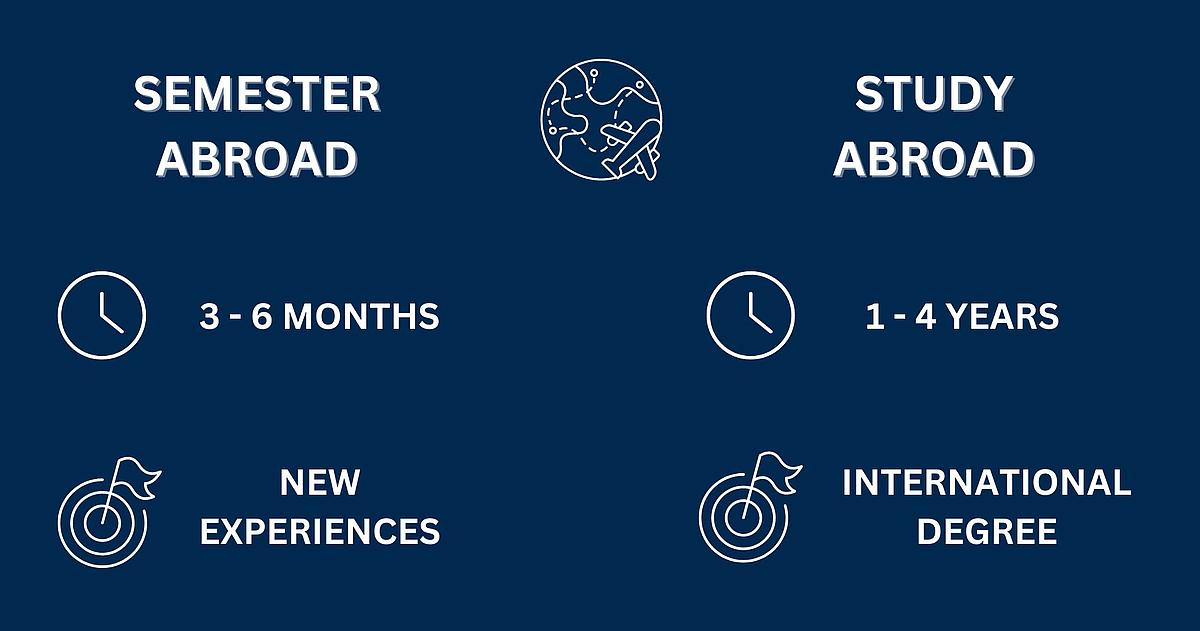This Website uses cookies to improve your visit on our website. More Info
Semester Abroad: Watch out for this!
Are you planning a semester abroad and looking for guidance? Our guide will take you through the most important steps - from choosing your destination country to financing options and tips for preparation. With practical advice and insider information, planning your stay abroad will be clear and easy to understand. Get ready for the adventure of a lifetime and start your international study experience well prepared!
Why is a Semester Abroad worthwhile?
A semester abroad offers a range of benefits that promote both personal and academic development. It enables students to gain international experience, learn about new cultures and develop intercultural skills, which are becoming increasingly important in the globalized world of work. By improving their foreign language skills and making international contacts during their semester abroad, students broaden their perspectives and improve their chances on the global job market. In addition, a semester abroad promotes independence, adaptability and problem-solving skills. These experiences contribute to personal maturity and can boost self-confidence. A semester abroad is therefore a valuable investment in your own future.
Advantages and Disadvantages of a Semester Abroad
This table summarizes the main advantages and disadvantages that should be considered when deciding on a semester abroad.
| Vorteile | Nachteile |
|---|---|
| Erwerb von internationalen Erfahrungen und interkulturellen Kompetenzen | Möglicherweise hohe Kosten und finanzielle Belastung |
| Verbesserung der Fremdsprachenkenntnisse | Herausforderungen bei der Anerkennung von Studienleistungen |
| Persönliches Wachstum und Entwicklung der Unabhängigkeit | Kulturelle und soziale Anpassungsschwierigkeiten |
| Erweiterung des akademischen Horizonts und Erlernen neuer Lehrmethoden | Heimweh und Trennung von Familie und Freunden |
| Aufbau eines internationalen Netzwerks | Organisatorischer Aufwand für Vorbereitung und Planung |
| Erhöhte Beschäftigungsfähigkeit durch internationale Erfahrung | Unterbrechung oder Verlängerung des Studiums möglich, aber nicht notwendig |
Semester Abroad or Study Abroad?
A semester abroad and a full study abroad program each offer unique experiences and benefits, but they differ in scope, duration and commitment. The choice between the two depends heavily on an individual's personal, academic and professional goals. Here are the key differences and considerations for both options:
Semester Abroad vs Study Abroad
The following graphic provides a brief overview of the key aspects of a semester abroad and studying abroad.

Semester Abroad or Study Abroad: Which is better?
Whether a semester abroad or a full study abroad program is "better" depends on individual needs and goals. A semester abroad offers a short-term experience with less commitment, while a study abroad program offers a deeper immersion into a different culture and educational system.
Do you have to choose just one?
You can actually do a semester abroad within a study abroad program. This could mean that a student who is already studying abroad decides to spend a semester or two in a third country. This requires careful planning in terms of course recognition and visa status, but offers an even broader international perspective and learning experience.
The decision should be based on careful consideration of personal and academic priorities, as well as the financial, time and cultural considerations associated with an extended stay abroad.
If you are looking for alternatives to a semester abroad, then take a look at our pages on Internship Abroad, Language Trip and the more general overview page on Staying abroad.
To the Overview Page of the GuideThe right time for a Semester Abroad
The right time for a semester abroad depends on various factors, including the degree program, the structure of the curriculum, personal goals and circumstances, and the requirements of the target university. In general, it is advisable to consider the following aspects:
- Academic requirements: Some degree programs have specific semesters in which a semester abroad fits better into the course of study, often in the second or third year of the Bachelor's program or the first year of the Master's program.
- Language skills: A certain level of proficiency in the language of instruction at the host university during the semester abroad may be required, which will affect the preparation time. At a minimum, you should have a solid knowledge of English.
- Application deadlines: Universities and scholarship programs have fixed application deadlines, which are often months before the planned start.
- Personal development: Some students prefer to strengthen their academic skills and independence at their home university first.
- Availability of courses: Planning should also take into account the availability of suitable courses that are recognized at the home university.
It is important to start planning early and to consult with the student advisory service and the International Office at your own university to determine the best time for a semester abroad.
DID YOU KNOW?:
A Semester Abroad is included in a Bachelor's or Master's degree at MBS.
Application for a Semester Abroad: Requirements & Procedure
The application requirements and the procedure for a semester abroad vary depending on the destination university, country and study program. Nevertheless, there are general steps and requirements that apply to most semesters abroad:

Application requirements
- Academic achievements: Many programs and host universities require a certain grade point average.
- Language proficiency: Proof of sufficient language proficiency in the language of instruction at the host university, often through standardized language tests such as TOEFL or IELTS for English.
- Study progress: Some programs require students to have completed a certain year of study.
- Letter of motivation: Explaining the reasons for the semester abroad and how it fits into your academic and personal career.
- Letter of Recommendation: One or more letters of recommendation from lecturers or academic supervisors are often required.
- Valid passport and visa: For entry and stay in the host country.
Procedure
- Obtaining information: Researching possible destination countries and universities, as well as the courses on offer.
- Advice: Discussions with the International Office or the student advisory service at the home university to clarify questions and help with planning.
- Application: Submission of application documents to the home university or directly to the host university, depending on the chosen program.
- Acceptance and preparation: After receiving acceptance, preparation begins, including applying for a visa, finding accommodation and planning the trip.
- Orientation: Participation in introductory and orientation events at the host university.
- Start of studies: Start of the semester abroad and acclimatization to the new academic and cultural environment.
- Credits: Completion of all academic requirements and collection of credits for recognition at the home university.
- Return: Return to the home university and submit the credits earned abroad for recognition
Early planning for a semester abroad, often a year in advance, is crucial in order to complete all the necessary steps in good time and have the best chance of a successful application.

Recognition of Achievements
during the Semester Abroad

| Before Dparture | Preliminary Clarification | Contact your course coordinator or the International Office in good time to find out about the procedure for the recognition of academic achievements from abroad. |
|---|---|---|
| Learning Agreement | Draw up a Learning Agreement or similar contract listing the courses you wish to take abroad and their equivalence to courses at your home university. This document should be approved by both universities. | |
| Module Descriptions | Collect detailed course descriptions and syllabi to facilitate recognition. | |
| During the Semester Abroad | Course Changes | If you need to change courses, inform the relevant offices at your home and host university immediately. Every change must be documented and approved in order to avoid problems with recognition later on. |
| Certificates of Achievement | Make sure that you successfully complete all required examinations and certificates and provide documentation of these achievements, e.g. in the form of transcripts or certificates. | |
| After your Return | Transcript of Records | Obtain an official transcript of records from your host university during your semester abroad, which lists all courses taken and grades achieved. |
| Recognition Process | Submit the required documents to the relevant office at your home university to start the recognition process. This usually includes the Transcript of Records, the course descriptions and the Learning Agreement. | |
| Follow-up | Stay in contact with the office or person responsible for recognition to monitor the process and ensure that all credits earned during the semester abroad are correctly recognized. | |
| Additional Tps | Documentation | Keep copies of all documents and correspondence. |
| Flexibility | Be prepared to provide additional information or documentation if your home university requires it for recognition. |
Recognizing credits earned during your semester abroad is an important step in ensuring that the semester is not only a personally enriching experience, but also contributes effectively to the progress of your studies. By following these steps carefully, you can maximize the likelihood that your semester abroad credits will be easily recognized and contribute to your academic progress.
Semester Abroad Organization
The choice of country and university for a semester abroad is a personal decision that should be made carefully. Take your time to research and consider several options to make the best decision for your academic and personal goals. Here are some tips to help you make this important decision:
Select the right Country
Define your Interests and Goals
Think about what you want from your semester abroad and what experiences you would like to gain. Are you interested in a particular culture, language or specific field of study?
Cost of living and Budget
Find out about the cost of living in different countries. Some countries offer a high level of education at a relatively low cost.
Security and political Stability
Research the current political and security situation in potential host countries.
Cultural Aspects
Consider how easily you can adapt to the culture of the host country. Cultural differences can be enriching, but also challenging.
Career Goals
Consider whether the country plays a role in your long-term career plans. Some countries have strong links to certain industries or professional fields.
Find the right University
Academic Reputation
Research the academic reputation and rankings of the universities in your subject area. The quality of teaching staff and research facilities are also important factors.
Course Offer
Make sure that the university offers courses or programs that match your academic goals and are recognized at your home university.
International Offices and Support Services
Check what support the university offers international students, e.g. orientation programs, language courses and counseling services.
Testimonials from other Students
Search for experience reports or testimonials from students who have already completed a semester abroad at the university.
Networking Opportunities
Consider the networking opportunities and career prospects that studying at university can offer. Universities with strong alumni networks can be very valuable for your career.
Further Considerations
- Language Barriers: Although many universities offer courses in English, you should consider language skills, especially if you plan to explore the country or take a part-time job in addition to your studies.
- Climate and geographical Location: Climatic conditions and geographical location can greatly affect your experience. Think about the best environment for you to live and study in.
DID YOU KNOW?:
Munich Business School has more than 60 partner universities worldwide, from Australia and South America to the USA. Discover the world with MBS.
Discover our Partner UniversitiesSemester Abroad Costs & Financing
The cost of a semester abroad can vary greatly depending on factors such as the destination country, the city, the host university, the standard of living and the student's individual requirements and lifestyle. The financing options are just as varied. Here is an overview:

Tuition fees
- Tuition fees: Some universities charge high fees, while programs such as Erasmus+ can waive or reduce tuition fees.
- Living costs: Rent, food, transportation, books and leisure activities. These vary considerably depending on the country and city.
- Travel costs: Flight tickets, visa fees and possibly travel insurance.
- Additional costs: Any language courses, vaccinations or special insurance that may be required.
Financing options
- Scholarships and funding programs: There are numerous scholarships that are awarded specifically for semesters abroad, e.g. by the DAAD, Erasmus+ or private foundations.
- BAföG funding abroad: Eligible students have the opportunity to apply for BAföG abroad, which can cover higher grants and also tuition fees for a semester abroad up to a certain amount.
- Student loans and education funds: Various banks and organizations offer special loans or funds for students spending a semester abroad.
- Part-time jobs: In some countries, students are allowed to work alongside their studies to supplement their income.
- Saving: Planning and saving well in advance can help cover some of the costs of a semester abroad.
- Crowdfunding: A creative way to raise money for the semester abroad is to present your plans online and ask for financial support.
Calculation
The total costs can range from a few thousand euros to more than ten thousand euros. Detailed budget planning in advance is crucial to avoid surprises. You should consider all possible costs and find out about financing options. It is also advisable to apply early for scholarships and funding programs, as many application deadlines are early in the year.
Checklist for your Semester Abroad
Careful planning is crucial for a successful semester abroad. The following checklist should help you to prepare for your semester abroad and not forget anything important. However, each country and university has its own requirements and processes, so it is important to find out about these specifically. Here is a comprehensive checklist that can help you prepare for your semester abroad adventure:
- Research the target university and country: Make sure that the target country and university meet your academic and personal expectations.
- Application and admission: Submit your application to the host university in good time and provide all the necessary documents.
- Clarify financing: Get an overview of the costs and secure funding (scholarships, BAföG abroad, own funds).
- Course selection and recognition: Clarify which courses you would like to take and how they will be recognized at your home university.
- Learning Agreement: Complete this important document together with your home and host universities.
- Apply for a visa: Check the visa requirements in good time and compile all the necessary documents for the application.
- Health and liability insurance: Ensure that you are adequately insured abroad.
- Finding accommodation: Look for accommodation early on, be it a student hall of residence or a private apartment.
- Book flight tickets: After receiving your visa and admission, book flights.
- International student card: Apply for this to benefit from discounts worldwide.
- Create a packing list: Don't forget not only clothes and personal items, but also important documents and study materials.
- Brush up on your language skills: If necessary, attend language courses or learn on your own to facilitate communication on site.
- Vaccinations: Check in good time whether you should brush up on certain vaccinations for the destination country.
- Safety: Find out about local emergency numbers and safety instructions.
- Cultural preparation: Find out about cultural customs and differences to minimize culture shock.
- Registration at the university: Complete all the formalities for enrollment at the host university.
- Attend orientation events: Attend all introductory and orientation events.
- Explore the city and surroundings: Familiarize yourself with your new surroundings, find out where important places are (supermarkets, hospitals, university facilities).
- Open a bank account: If necessary, open a bank account in the host country.
- Buy a local SIM card: To be reachable in your new country and have internet access.
- Build a network: Join student groups or associations and make contacts with local and international students.
Supplement: Packing list for a Semester Abroad
A well thought-out packing list is crucial for a successful semester abroad. Keep in mind that the following list is a general list for a semester abroad. Adapt it according to your specific needs, the conditions of the host country and the airline's baggage restrictions. It is also advisable to check before departure what is already available in your accommodation or can easily be purchased locally to avoid excess baggage. Here is some important items for the list that many people quickly forget when spending a semester abroad:
- Identity card & passport if necessary (valid beyond the return date)
- Visa (if required)
- Flight tickets
- Letter of admission from the host university
- Learning Agreement
- International student card
- Insurance documents (health, accident, liability insurance)
- Driver's license (and international driver's license if you plan to drive)
- Copies of all important documents (keep separately and back up digitally)
- Debit/credit cards (make sure they work internationally)
- Some cash in the currency of the host country
- Information on bank accounts
- Adapter for power sockets (depending on the destination country)
- First-aid kit (first aid kit, personal medication)
- Possibly a travel guide and dictionary, otherwise suitable apps to help
Further Study Guide Topics:
Staying abroad
Language Trip
Internship Abroad
Working alongside your Studies
Frequently asked Questions about a Semester Abroad
A semester abroad usually lasts around 3 to 6 months, depending on the academic calendar of the host university.
A semester abroad offers numerous benefits, including the opportunity to experience a new culture, improve language skills, build an international network, promote personal development, increase adaptability and enhance employability through the acquisition of intercultural skills and international experience.
The cost of a semester abroad can vary greatly and depends on several factors, including the host country, the university, the cost of living there and travel and visa costs. They range from a few thousand euros to over ten thousand euros per semester. Many students use scholarships, Erasmus grants or other financial support programs to cover these costs.
A semester abroad can be financed through various sources, including scholarships from universities, private foundations or government organizations, educational loans, Erasmus+ programs for students in Europe, financial support from the home university or personal savings. Part-time jobs abroad or crowdfunding platforms are also options that students can consider.
A semester abroad on a Master's degree program is often completed in the first or second year, with the exact timing depending on the structure of the respective Master's program, the requirements of the home and host universities and the student's personal academic and professional goals. It is advisable to plan this early on with the student advisor to ensure that the stay abroad can be optimally integrated into the course of study.
Interested in a Study Program? Request our Information Material now!
More exciting Degree Programs in Munich













